Revolutionizing Smart Living: Unveiling IoT Innovations at IFA 2023
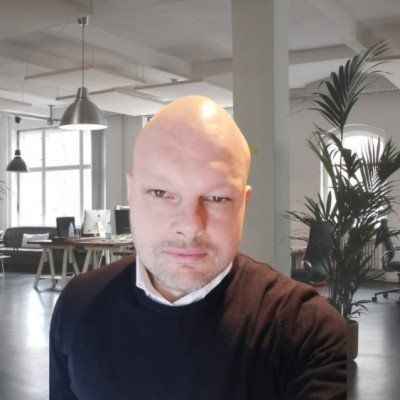
Daniele Delle Case
Published: January 12, 2023
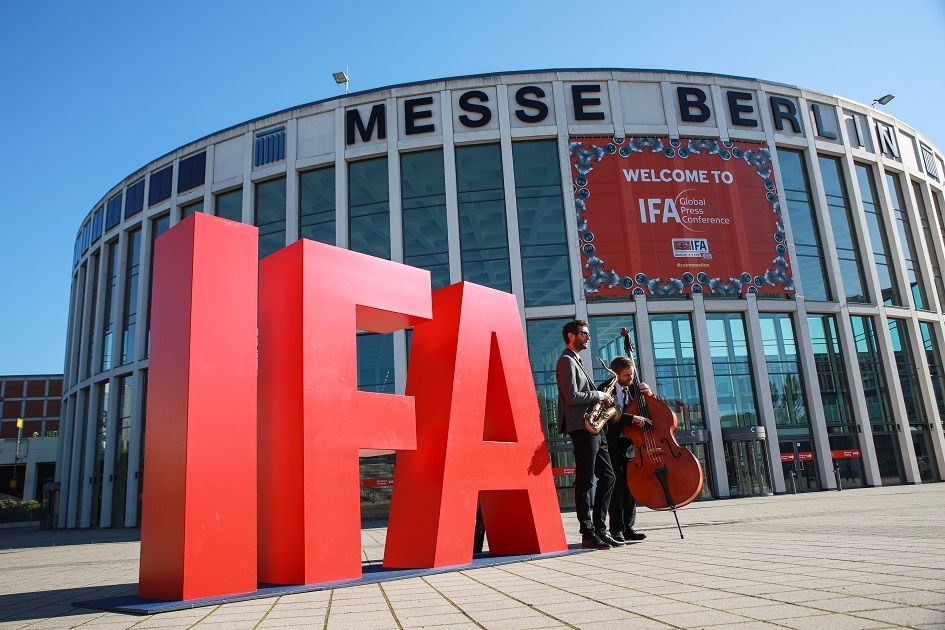
The Pervasive Influence of IoT in Contemporary Life
In the digital age, the Internet of Things (IoT) stands out as a groundbreaking innovation, reshaping the contours of our daily existence. These smart devices, equipped with the capability to communicate and operate autonomously, have eliminated the need for constant human intervention. This seamless data transfer across a vast network system has ushered in an era of unparalleled convenience and efficiency.
IoT is not just a household phenomenon; it's a game-changer in the business realm as well. Companies, irrespective of their size, can now gain real-time insights into their operations, ensuring proactive decision-making and enhanced productivity.
The soaring popularity of IoT devices can be attributed to several factors. Enhanced safety and security top the list, with users now having the power to monitor and control their home security systems from any corner of the globe. The convenience factor is undeniable, with the ability to manage appliances remotely. Moreover, the emphasis on sustainability is evident, as IoT devices enable users to monitor and optimize energy consumption, paving the way for a greener future.
As we delve deeper into the innovations unveiled at IFA 2023 and the myriad applications of IoT, it becomes evident that we are on the cusp of a technological renaissance, one that promises to make our lives smarter, safer, and more sustainable.
The Emergence of Ecosystems and Circles
A. The Concept of Ecosystems and Circles
The IFA 2023 exhibition was a testament to the evolving dynamics of IoT, with the emergence of 'Ecosystems' and 'Circles' as the new buzzwords. The concept of Ecosystems refers to the integration of various smart devices into a single, unified network, all controlled via a single app. This interconnectivity allows for seamless communication and operation between devices, enhancing user convenience and efficiency.
On the other hand, the more advanced 'Circles' take this concept a step further. In addition to the basic ecosystem, Circles incorporate specific goals to be achieved through automation, such as energy conservation or perfecting a culinary dish. This goal-oriented approach adds a new dimension to the IoT experience, making it more personalized and purposeful.
B. Examples from the Exhibition
Several brands showcased their unique interpretations of these concepts at IFA 2023. AEG, for instance, demonstrated how their washing machines and dryers learn from user behavior. After three uses, the machines propose the same programs as default, effectively creating a personalized ecosystem for the user. Moreover, the machines offer energy-saving tips, further enhancing their eco-friendly appeal.
MIDEA's Smart Home system exemplifies the concept of Ecosystems. The system recognizes food items in the refrigerator and, when extracted, sets the corresponding recipe in the oven. This automation not only simplifies the cooking process but also aims to achieve the goal of quick and efficient meal preparation.
HAIER's 'Active Circles' system takes this a notch higher. Users can set targets, and the system assists in achieving them by offering suggestions. For instance, it might propose reducing the temperature or adjusting the battery charging schedule based on the user's sleep patterns. This intelligent system creates a Circle that is not just interconnected but also proactive in achieving set goals.
These examples underscore the potential of Ecosystems and Circles in revolutionizing our interaction with smart devices. By creating a network of devices that not only communicate with each other but also learn from user behavior and work towards specific goals, these concepts are setting the stage for the next wave of IoT innovation.

III. The Extended Role of Automation in IoT
The IFA 2023 exhibition highlighted the growing importance of automation in the realm of IoT. Automation, in this context, refers to the ability of smart devices to operate and make decisions independently, without the need for human intervention. This extends beyond simple tasks like turning on a light or adjusting the temperature. Today's smart devices are capable of complex operations, such as recognizing food items, setting cooking instructions, and even managing energy consumption.
The exhibition showcased several examples of this advanced automation. For instance, MIDEA's Smart Home system can recognize food items in the refrigerator and automatically set the corresponding recipe in the oven. Similarly, HAIER's washing machines can automatically set the washing program based on the label of the clothing item.
Moreover, automation is not limited to individual devices. Many brands showcased how their devices can communicate and coordinate with each other to optimize operations. For example, Siemens' Home Connect app allows for information exchange between different appliances, such as a washing machine and a dryer, to optimize their operations.
This advanced automation is made possible by the integration of Artificial Intelligence (AI) into these devices. AI enables these devices to learn from user behavior and make decisions accordingly. This not only enhances user convenience but also improves the efficiency and effectiveness of these devices.
IV. The Rise of Artificial Intelligence (AI)
A. The Role of AI in IoT and Smart Products
Artificial Intelligence (AI) has emerged as a game-changer in the realm of IoT and smart products. AI refers to the capability of machines to mimic human intelligence, enabling them to learn from experience, adapt to new inputs, and perform human-like tasks. When integrated into IoT devices, AI can enhance their functionality, making them more intuitive and efficient.
AI plays a crucial role in enabling advanced automation in IoT devices. It allows these devices to learn from user behavior and make decisions accordingly. For instance, a smart washing machine can learn the user's preferred washing cycle and automatically set it as the default. Similarly, a smart refrigerator can recognize the food items inside it and suggest recipes accordingly.
Moreover, AI can also enhance the energy efficiency of IoT devices. By learning the user's habits and preferences, these devices can optimize their operations to conserve energy. For instance, a smart thermostat can learn the user's preferred temperature settings and adjust them to minimize energy consumption.
B. How Companies are Integrating AI into Their Products
Several companies showcased their AI-integrated products at IFA 2023. Chinese companies, in particular, demonstrated extensive use of AI in their devices. European companies like Siemens, Bosch, and Gorenje also showcased their AI-powered products.
For instance, AEG's washing machines and dryers learn from the user's usage and propose the same programs as default after three uses. MIDEA's Smart Home system recognizes food items in the refrigerator and sets the corresponding recipe in the oven. HAIER's washing machines can automatically set the washing program based on the clothing label.
Bosch showcased a unique application of AI with its detergent scanning feature. The machine scans the detergent and self-regulates to minimize its usage. Siemens' Home Connect app allows for information exchange between appliances to optimize their operations. The company's coffee machines can recognize the coffee bean type and self-regulate accordingly.
These examples demonstrate the transformative potential of AI in IoT and smart products. By enabling advanced automation and personalization, AI is set to revolutionize our interaction with these devices, making our lives more convenient and efficient.
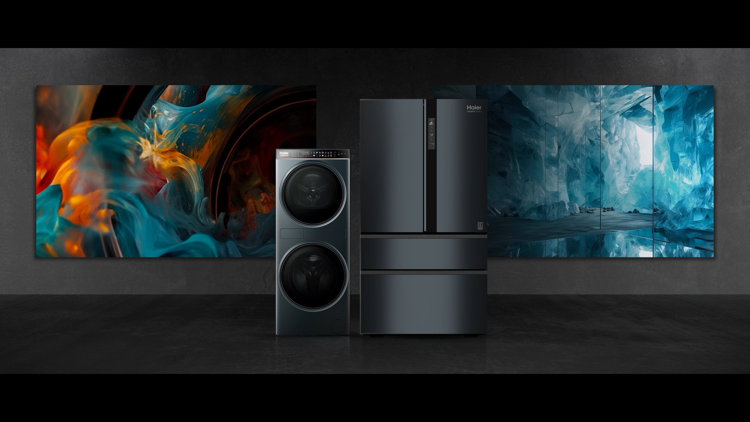
Brand-Specific Innovations that hit my interest.
AEG: Self-learning washing machines and dryers
AEG, showcased their innovative washing machines and dryers at IFA 2023. These appliances are designed to learn from user behavior. After three uses, these machines propose the same programs as default, effectively creating a personalized ecosystem for the user. Moreover, they offer energy-saving tips, further enhancing their eco-friendly appeal.
These machines automatically adjust time, water, and energy usage, making them highly efficient and environmentally friendly. In addition to this, they come with a new add-on filter that catches up to 90% of microplastic fibers released by synthetic clothing. This feature not only improves the washing process but also contributes to environmental conservation by reducing microplastic pollution."
MIDEA: Smart Home system with food recognition
MIDEA’s Smart Home system exemplifies the concept of Ecosystems. The system recognizes food items in the refrigerator and, when extracted, sets the corresponding recipe in the oven. This automation not only simplifies the cooking process but also aims to achieve the goal of quick and efficient meal preparation.
In addition, Midea introduced its latest green complete solution for the smart home at IFA 2023. Leveraging free energy sources like solar energy, Midea’s energy management system MHELIOS and the multi-split CirQHP system with heat recovery technology are committed to achieving sustainable and economical energy use and providing a more eco-friendly user experience.
Midea demonstrated its dedication to intelligent energy conservation by integrating a Breezeless E AI energy-saving algorithm that learns and adapts to evolving environments and frees users from manual adjustments
HAIER: Active circles and smart appliances
HAIER’s ‘Active Circles’ system takes automation a notch higher. Users can set targets, and the system assists in achieving them by offering suggestions. For instance, it might propose reducing the temperature or adjusting the battery charging schedule based on the user’s sleep patterns. This intelligent system creates a Circle that is not just interconnected but also proactive in achieving set goals.
Haier Europe presented several new product ranges at IFA 2023, both under the Haier brand and Candy and Hoover. The common thread is innovation in terms of functionality and energy consumption. Haier’s strategy is to focus more and more on user experience and services, in addition to the quality of its appliances. The excellent performance of the hOn platform is driving the evolution of Haier’s proposal.
For example, Haier launched the new ID Series ovens with Bionicook technologies at IFA 2023. The most innovative of these is Bionic Vision, a machine learning-based system that uses an integrated camera in the oven to recognize what you want to cook, automatically set the correct cooking parameters, and control the entire process by following the cooking until its conclusion by analyzing the state of the food
BOSCH: Detergent scanning for optimized usage
BOSCH showcased a unique application of AI with its detergent scanning feature. The machine scans the detergent and self-regulates to minimize its usage. This feature not only ensures optimal cleaning but also contributes to sustainability by reducing detergent waste.
SIEMENS: Home connect app and smart appliances
Siemens' Home Connect app allows for information exchange between appliances to optimize their operations. The company's coffee machines can recognize the coffee bean type and self-regulate accordingly. Their ovens, equipped with computer vision, can automatically recognize food items, recipes, and cooking degrees, simplifying the cooking process.
ELECTROLUX: 3D sensors for fabric identification
ELECTROLUX showcased their innovative use of 3D sensors in their dryers. These sensors can identify the type of fabric and the degree of dryness, ensuring optimal drying and fabric care.
LG: Load recognition in laundry machines
LG's laundry machines can recognize the type of load based on the movement dynamics. They can then automatically adjust the water, detergent, and program accordingly, ensuring optimal cleaning and fabric care.
GORENJE: User habit recognition and temperature adaptation
GORENJE's smart appliances can recognize user habits and adapt the temperature accordingly in advance. This feature not only enhances user comfort but also contributes to energy efficiency.
HISENSE: Automatic program selection in washing machines
HISENSE's washing machines can automatically select the washing program based on various factors such as the weight of the laundry, water turbidity, water temperature, detergent used, water quantity, fabric type, and water hardness. This feature ensures optimal cleaning while also conserving resources.
These brand-specific innovations highlight the diverse applications of IoT and AI in smart products. They demonstrate how these technologies can enhance user convenience, improve product efficiency, and contribute to sustainability.
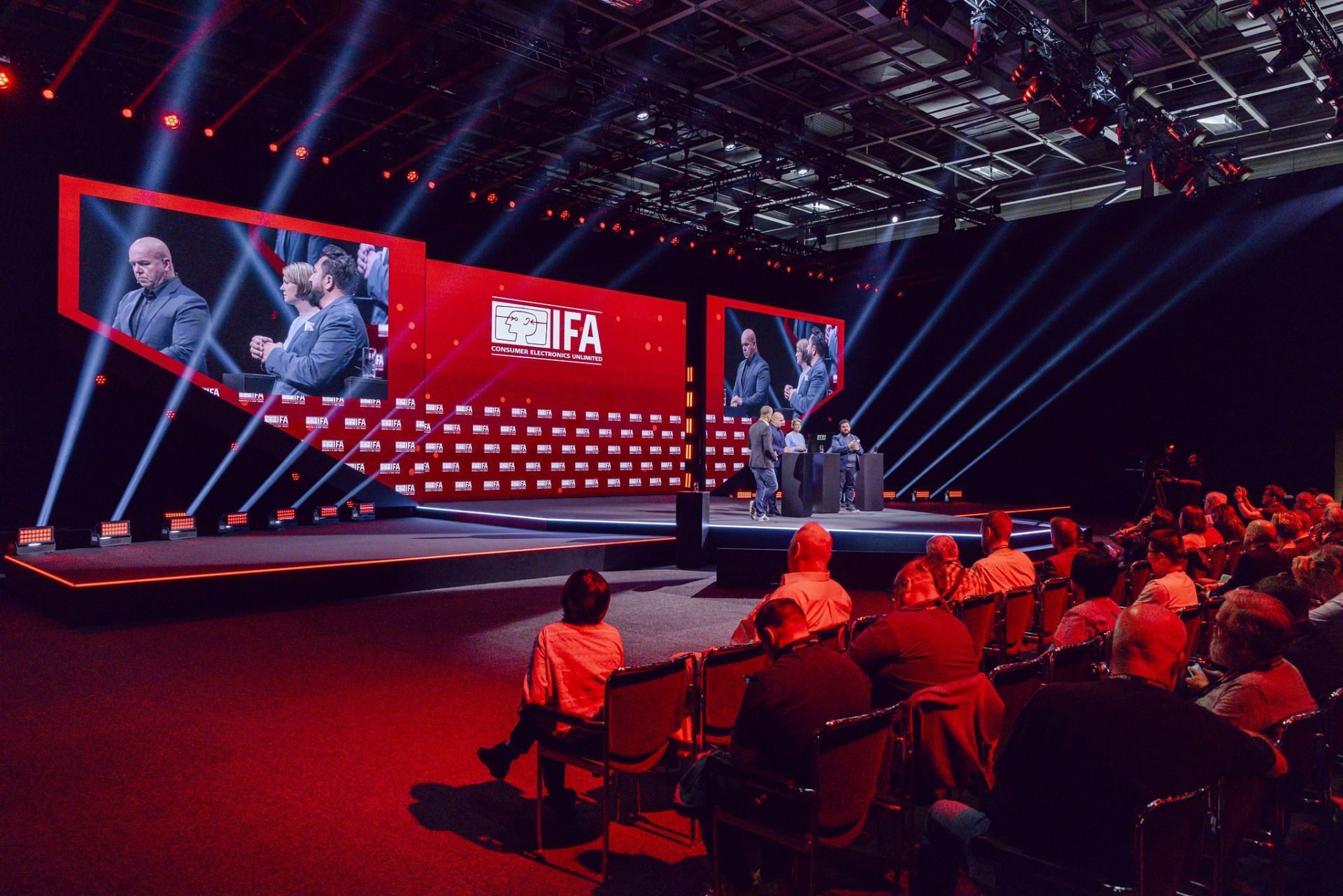
Conclusion
A. Recap of the Key Innovations at IFA 2023
IFA 2023 was a testament to the transformative potential of IoT and AI in revolutionizing our daily lives. The exhibition showcased a plethora of innovative smart products, each with its unique features and applications. From AEG's learning washing machines and dryers to MIDEA's Smart Home system with food recognition, from HAIER's Active Circles system to BOSCH's detergent scanning feature, the innovations unveiled at IFA 2023 were truly groundbreaking.
The emergence of 'Ecosystems' and 'Circles' as the new buzzwords in the realm of IoT was particularly noteworthy. These concepts, which refer to the integration of various smart devices into a single, unified network with specific goals, promise to enhance the user experience by making it more personalized and purposeful.
The exhibition also highlighted the growing importance of automation and AI in IoT. These technologies enable smart devices to operate and make decisions independently, enhancing their functionality and efficiency. The integration of AI into these devices allows them to learn from user behavior and adapt accordingly, making them more intuitive and user-friendly.
The Future of IoT and Smart Products Based on Trends Seen at the Exhibition
IFA 2023 unveiled innovations that give us a glimpse into the future of IoT and smart products. The trend towards increasingly interconnected and intelligent devices is evident, with the emergence of Ecosystems and Circles and the growing integration of AI.
In the near future, we will see smart devices that not only communicate with each other but also learn from user behavior and pursue specific objectives. These devices, in addition to improving user convenience, will contribute to sustainability by optimizing energy consumption.
AI will become increasingly integrated into these devices, allowing them to perform more complex tasks and make more informed decisions. This will further enhance their functionality and efficiency, making our lives even more convenient.
IFA 2023 was a window into the future of IoT and smart products. The innovations presented are a sign of the exciting advancements that await us in this sector.
At Things5, we are at the forefront of this technological revolution, assisting appliance manufacturers in creating the next generation of AI-driven smart products. Our team of experts uses their deep knowledge of IoT and AI to devise innovative solutions that enhance product functionality and offer a superior user experience. Whether it's integrating AI into your products, creating interconnected ecosystems, or developing goal-oriented circles, we have the skills and experience to make it happen. We invite you to join us on this exciting journey towards a smarter and more sustainable future. Don't just be observers of this technological revolution; become a part of it. Contact us today to find out how we can help you transform your products and revolutionize the way people live.

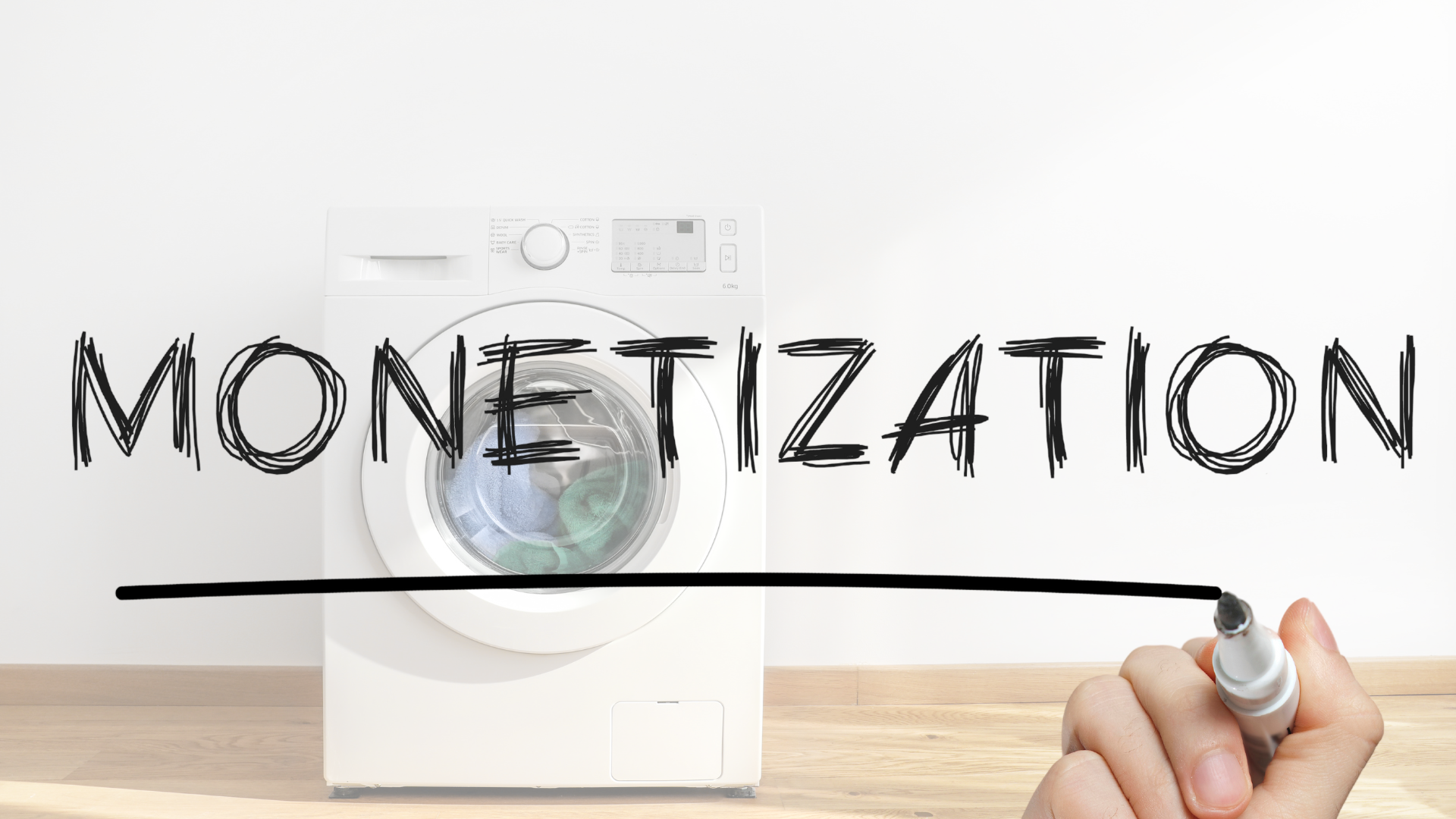
USEFUL LINKS
SUBSCRIBE TO OUR NEWSLETTER
You need a helping hand with your project?
We will get back to you as soon as possible
Please try again later
All Rights Reserved | Visup Srl | VAT: IT09299620964


